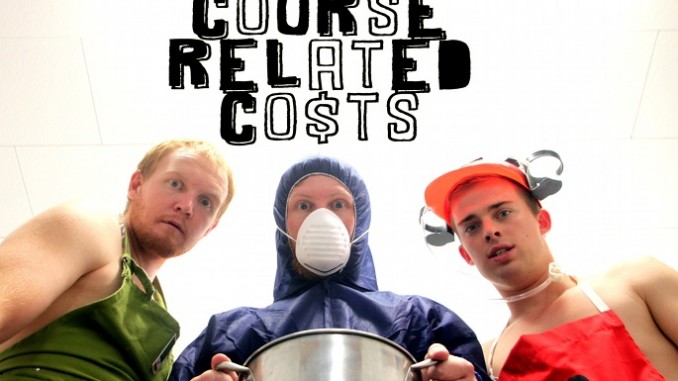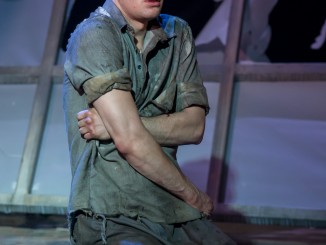
Drugs are bad, mmmkay? [by James Wenley]

You just know that things are going to come crashing down in Course Related Costs, the only questions are how, and how badly.
The set-up is this: After the mainstay of the student drinking budget, ‘course related costs’ has dried up, Pete, Monty and AJ have installed a P lab in their flat. The three are affable white trash slackers, living in squalor, easy going and worrying little about any potential consequences. There are two worn couches, a TV, Star Wars and Trainspotting posters on the wall, and rubbish is stacked on piles on the floor – part of a noticeable theatre trend in Auckland (These are the Skeletons of Us, Tigerplay) that seems to be focus on grungy living and characters that barely look after themselves, not to mention their surroundings.
Pete (Brad Johnson) is the cool headed one with the plan. AJ (Tarquinn Kennedy) seems to clean-cut for his surrounding, but we soon learn how messy his personal life is. Jordan Mooney’s Monty is the most loathsome and the funniest, an easily amused doofus (he of the lowest common dominator humour), who plays Super Mario Bros religiously. They are joined by Angie (Sarah Graham), Pete’s sister, who makes a strong impression with the little material she is given.
There’s no moralising about the ethics of drug production, but the presence of Jacqui Nauman as Bev, AJ’s ex-girlfriend, is a confronting figure compared to the funny slackers, erratic and shaking, she gives an all too real impression of craving and drug dependency.
The stakes are raised considerably when Devlin Bishop’s Benefactor walks through the door. Sadistic, surprisingly intelligent, and sporting a dirty goatee, he’s a menacing figure that hints at the dark places this tale might go. He informs them a van is coming to pick up their product, and leaves with the warning “Don’t fuck up”.
Hapless National politician Henry (Andrew Ford) has the misfortune of entering the flat canvassing for votes, and gets drawn into the plot.
The last and greatest pieces of the puzzle are Randy (Chris Tempest) and Earl (Joel Herbert), the pick-up guys who are brilliantly seated in a van front piece with shining headlights, behind either side of the audience. They are there from the start of the show, and even direct me to the best seats in the house! The miss-matched pairing (Earl by the book, Randy eternally dim) are a winning double act, discussing the ethics of culpability, racism, shark evolution, Meatloaf, and enjoy sing-alongs together. The play’s action frequently cuts to them to break the tension, and they’ve always got something fun to say – playwright Colin Garlick’s comedic riffs are strongest here, even if it is only tangentially related to the story’s main action.
The show uses an appealingly flippant style of meta-theatricality, characters smashing the fourth wall to talk to us, while other characters tell them to give them a rest. Towards the end, one character steps forward, but rethinks it, not wanting to go for the ‘cheap gag’.
It’s a telling moment – as if Garlick as playwright really debating what road he wants to take with the script – dark comedy for the laughs or serious character drama for the shocks? Considering all the characters in play – the flatties, the sister, the politician, the druggie, the crazed benefactor, the pick-up guys – the action only escalates to a point, forgoing the satisfaction of more twists and turns and even more going wrong. In the end, we are left only guessing the fates of most of our main characters. One plot point compares a little too closely to Outfit’s previous and brilliant show Punk Rock, and felt cheaper as a result.
There’s a sense too that we have spent only a little time with each of the characters (except for Randy and Earl, with enjoyed hanging out with them plently!). The potential of the politician character for satire or flipping our expectations of the character around is underutilised, gagged far too early. The action unfolds tightly over one afternoon, but I wonder if we might learn and care more for the flatmates if we see saw the back-story unfold too – the original formulation of the drug making, the first unsuccessful attempts, and so on.
Course Related Costs is part of the Outfit’s annual Factory Floor season where the company try out new ideas and skills (last year they produced gimmicky but cool Love After Dark). Newish to directing Pete Coates points out that the play, Colin Garlick’s first full length, is still under development, “still on the factory floor if you will”.
Garlick has all the right ingredients, or should I say chemicals, but they aren’t quite cooked together for enough time (or whatever the metaphorical drug making equivalent is, don’t ask me!). There’s room to go bolder, darker, and generally more fucked up. Having said that, this Factory Floor is a great success, debuting a confident new writer within the Outfit’s usual theatrical mischief.
Course Related Costs is presented by Outfit Theatre Company Factory Floor Season, and plays at The Basement until 2nd June. More details see The Basement.




Leave a Reply